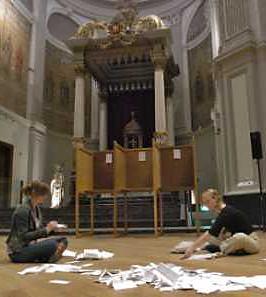at the Altar of Facts
From Log24,
April 28, 2005:
(See also Log24,
April 5, 2005.)
Compare this diagram with that of
Samuel Beckett in Quad (1981):

Related quotation:
Barry Mazur on a seminal paper of algebraist Saunders Mac Lane:
The paper was rejected “because the editor thought that it was ‘more devoid of content’ than any other he had read. ‘Saunders wrote back and said, “That’s the point,”‘ Mazur said. ‘And in some ways that’s the genius of it. It’s the barest, most Beckett-like vocabulary that incorporates the theory and nothing else.'”

Prime Minister of France:
“M. de Villepin positively worships Napoleon, and models himself after his hero. In a 600-page biography, Villepin wrote admiringly about the difference between great men like Napoleon and the ‘common run’ of men. It is worth reading every word carefully.
‘Here we touch on that particular essence of great men, on what distinguishes Napoleon or Alexander, Caesar or de Gaulle, from the common run. It is excess, exaltation, and a taste for risk that forms their genius. It is why they are often better understood in their élan by writers and poets, who are possessed of the same thirst for the absolute, than by those who pray at the altar of facts.’
(New Republic)
And in praise of French nationalism, de Villepin wrote,
‘The Gaullist adventure renewed the élan of [Napoleon’s] Consulate through the restoration of a strong executive and the authority of the State, the same scorn for political parties and for compromise, a common taste for action, and an obsession with the general interest and the grandeur of France.’
Those words come straight from 1800. Napoleon’s ‘genius,’ his ‘thirst for the absolute,’ ‘excess, exaltation, and a taste for risk,’ ‘a strong executive and the authority of the State,’ ‘his ‘scorn for political parties and for compromise,’ and ‘an obsession with the grandeur of France’ — it is all classic national hero worship. But today that kind of thinking is used to promote a new vision of destiny, the European Union.”

